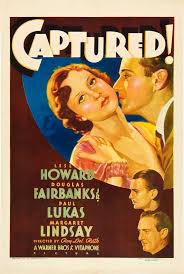
CAPTURED!
US, 1933, 69 minutes, Black and white.
Leslie Howard, Douglas Fairbanks Jr, Paul Lukas, Margaret Lindsay, Robert Barrett, J.Carol Naish.
Directed by Roy Del Ruth.
Captured is an early film by veteran director Roy Del Ruth, a prolific director in the succeeding decades, in many genres.
This is a war story from a book by Sir Philip Gibbs. It has a background of aviation during World War I, flights, crashes, and the capture of pilots and the internment in concentration camps. While the techniques are of the 1930s, it is nevertheless an interesting story and well worth seeing.
Leslie Howard is a British pilot who is interned. Douglas Fairbanks Jr is his friend who has fallen in love with Howard’s wife – although they had only a courtship of six days, marriage and the buying of a house before he went to war. When Fairbanks is interned, he is conscious of the betrayal of his friendship, especially as Howard keeps insisting on news about his wife, wondering about her not writing to him.
Paul Lukas, later to win an Oscar for Watch on the Rhine, is a more benign camp Commandant, an Oxford graduate who is happy to share reminiscences with the prisoners.
There is an escape attempt, harsh treatment as a consequence, Fairbanks also escaping, then Howard organising a mass escape, a great escape, from the camp, using the German planes.
One of the interesting features of the film is the use of German language throughout, German characters speaking only in German when speaking amongst themselves or commanding the prisoners.
This film is interesting to see in terms of the Motion Picture Code and its strict introduction in 1934, a much more open presentation of adultery and, surprisingly, some brief nudity in the shower block scene, something which would not be permitted in decades to come.
1. A between-the-wars drama? Capturing the memory of World War I? In the light of the many prisoner-of-war dramas to come from World War II?
2. An early sound film, studio work? Creation of the prisoner of war camp? The exterior scenes? Hut interiors The flight sequences? The musical score?
3. The importance of the use of German language throughout the film whenever Germans were speaking amongst themselves? The effect of this use of language for English-speaking audiences?
4. The cast, at this stage of their careers? Later prominence?
5. The introduction to Fred, the meeting with Monica, falling in love, the quick marriage, buying the house? His being called up? In war, his being captured?
6. The picture of the prisoner of war camp, the Commandant, the soldiers and guards, treatment of the prisoners? The rain, the inspections, the harsh attitudes? The change of commander, his more humane approach, yet the German control and Berlin wanting him to be authoritarian?
7. The British? Their memories? In France? The American, his picture of the cow, his memories of Texas? Strogin, his intensity? Later repercussions, the murder and rape, his confession, hanging himself?
8. Fred, his Oxford background, his cultivated manner and speech? With the rest of the men? The dangers of escape? The punishment of all the men, confined to a basement? The outbreak, the shootings, the repercussions?
9. Dig, his background, friendship with Fred, Oxford days? With the new batch of prisoners? Renewing friendship? Yet Dig and his reticence, not wanting to talk about Monica, Fred and his obsessive wanting to discuss? Her not having written? The audience knowing the truth, the relationship, the theatre, in love – and the letters that Dig received? Dig and his wanting to escape, Fred and his warnings, his taking responsibility, the escape, through the fence, the plane, reporting to the authorities? Back in London, seeing Monica? His being arrested, taken back to the lines? The white flags and being handed over to the Germans? The soldiers and their exchanging cigarettes, then gunfire? The accusation, rape and murder, Fred and his signing the document after reading Monica’s letters to Dig? Dig and Fred’s anger, the discussions with Fred, his reticence, the Commandant not understanding, his being lined up for the firing squad?
10. Fred, reading the letter, realising the truth? His anger, signing the document to bring Dig back? His animosity when Dig arrived, the discussions about Monica, Fred and his sense of detachment?
11. The character of the Commandant, civilised, breakfast, meeting the troops, warning about escapes? Summoning Dig back? The court trial, Dig in silence, the sentence?
12. Strogin and his madness, writing the confession, Fred and his disregarding it, crumbling it, waking up, Dig going to the firing squad, Fred’s conscience, the confession?
13. Fred, organising the escape, the timing, the shooting, men going to the planes, taking off? Fred staying behind, shooting, the grenade and his death?
14. An interesting war story? In the context of World War I?